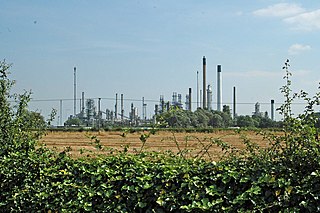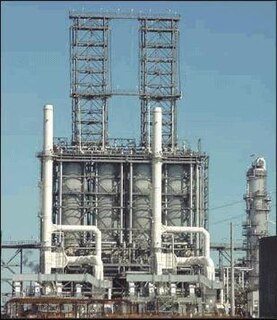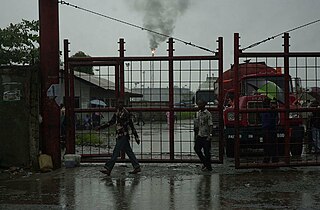Related Research Articles
Koch Industries, Inc. is an American privately-held multinational conglomerate corporation based in Wichita, Kansas. Its subsidiaries are involved in the manufacturing, refining, and distribution of petroleum, chemicals, energy, fiber, intermediates and polymers, minerals, fertilizers, pulp and paper, chemical technology equipment, ranching, finance, commodities trading, and investing. Koch owns Infor, Invista, Georgia-Pacific, Molex, Flint Hills Resources, Koch Pipeline, Koch Fertilizer, Koch Minerals, Matador Cattle Company, i360, and Guardian Industries. The firm employs 120,000 people in 60 countries, with about half of its business in the United States. The company is the largest non-Canadian landowner in the Athabasca oil sands.
Coal gas is a flammable gaseous fuel made from coal and supplied to the user via a piped distribution system. It is produced when coal is heated strongly in the absence of air. Town gas is a more general term referring to manufactured gaseous fuels produced for sale to consumers and municipalities.
Coal gasification is the process of producing syngas—a mixture consisting primarily of carbon monoxide (CO), hydrogen (H2), carbon dioxide (CO2), natural gas (CH4), and water vapour (H2O)—from coal and water, air and/or oxygen.

Sasol Limited is an integrated energy and chemical company based in Sandton, South Africa. The company was formed in 1950 in Sasolburg, South Africa and built on processes that were first developed by German chemists and engineers in the early 1900s. Today, Sasol develops and commercialises technologies, including synthetic fuels technologies, and produces different liquid fuels, chemicals and electricity.

Petroleum coke, abbreviated coke or petcoke, is a final carbon-rich solid material that derives from oil refining, and is one type of the group of fuels referred to as cokes. Petcoke is the coke that, in particular, derives from a final cracking process—a thermo-based chemical engineering process that splits long chain hydrocarbons of petroleum into shorter chains—that takes place in units termed coker units. Stated succinctly, coke is the "carbonization product of high-boiling hydrocarbon fractions obtained in petroleum processing ". Petcoke is also produced in the production of synthetic crude oil (syncrude) from bitumen extracted from Canada’s oil sands and from Venezuela's Orinoco oil sands.

Farmland Industries was the largest agricultural cooperative in North America when it eventually sold all of its assets in 2002–04. During its 74-year history, Farmland served its farmer membership as a diversified, integrated organization, playing a significant role in agricultural markets both domestically and worldwide.

The Humber Refinery is a British oil refinery in South Killingholme, North Lincolnshire. It is situated south of the railway line next to the A160; Total's Lindsey Oil Refinery is north of the railway line.

A delayed coker is a type of coker whose process consists of heating a residual oil feed to its thermal cracking temperature in a furnace with multiple parallel passes. This cracks the heavy, long chain hydrocarbon molecules of the residual oil into coker gas oil and petroleum coke.

Qatar Petroleum (QP) is a state owned petroleum company of Qatar. The company operates all oil and gas activities in Qatar, including exploration, production, refining, transport, and storage. QP's President & CEO is Saad Sherida Al-Kaabi, Minister of State for Energy Affairs. QP's operations are directly linked with state planning agencies, regulatory authorities, and policy making bodies. Together, revenues from oil and natural gas amount to 60% of the country's GDP. As of 2018 it was the third largest oil company in the world by oil and gas reserves.

Sirte Oil Company (SOC) is an oil and gas company in Libya operating under the state-owned National Oil Corporation (NOC). The company is located in Brega SOC’s operations include oil and gas exploration and production (E&P) and manufacturing.
The wet sulfuric acid process (WSA process) is one of the key gas desulfurization processes on the market today. Since the Danish catalyst company Haldor Topsoe introduced and patented this technology in the late 1980s, it has been recognised as an efficient process for recovering sulfur from various process gases in the form of commercial quality sulfuric acid (H2SO4), with simultaneous production of high pressure steam. The WSA process is applied in all industries where removal of sulfur is an issue.

The Tema Oil Refinery (TOR) is one of two crude oil refineries in Ghana.
Mekog was a chemical company founded 1928 that manufactured fertilizer using hydrogen from coke oven gas as a feedstock. The company's facilities were located on the site of the Koninklijke Nederlandsche Hoogovens en Staalfabrieken steelworks near IJmuiden in the Netherlands.

Hydrogen Energy California (HECA) was an alternative energy, hydrogen power project in development with support from the U.S. Department of Energy in Kern County, California.
CVR Partners LP is a public traded company, based in Sugar Land, Texas, that manufactures and provides nitrogen fertilizer products. It is a subsidiary of Coffeyville Resources, which is owned by CVR Energy Inc. The company was formed by CVR Energy to operates its nitrogen fertilizer business. CVR Energy, Inc. was listed as a 2012 Fortune 500 company with NO.5 ranking in Houston Chronicle.

The Port Harcourt Refining Company,, is a Nigeria-based oil and gas company primarily specializing in the refining of crude oil into petroleum products. It is headquartered in Port Harcourt metropolitan area of Rivers State, southeastern Nigeria. The company is a subsidiary of the Nigerian National Petroleum Corporation (NNPC).
Coal gasification is a process whereby a hydrocarbon feedstock (coal) is converted into gaseous components by applying heat under pressure in the presence of steam. Rather than burning, most of the carbon-containing feedstock is broken apart by chemical reactions that produce "syngas." Syngas is primarily hydrogen and carbon monoxide, but the exact composition can vary. In Integrated Gasification Combined-Cycle (IGCC) systems, the syngas is cleaned and burned as fuel in a combustion turbine which then drives an electric generator. Exhaust heat from the combustion turbine is recovered and used to create steam for a steam turbine-generator. The use of these two types of turbines in combination is one reason why gasification-based power systems can achieve high power generation efficiencies. Currently, commercially available gasification-based systems can operate at around 40% efficiencies. Syngas, however, emits more greenhouse gases than natural gas, and almost twice as much carbon as a coal plant. Coal gasification is also water-intensive.
The oil and gas industry in India dates back to 1889 when the first oil deposits in the country were discovered near the town of Digboi in the state of Assam. The natural gas industry in India began in the 1960s with the discovery of gas fields in Assam and Maharashtra. As on 31 March 2018, India had estimated crude oil reserves of 594.49 million tonnes (MT) and natural gas reserves of 1339.57 billion cubic meters (BCM).
Heysham oil refinery was located between Heysham and Middleton on the Heysham peninsula, Lancashire. It was built during the Second World War to produce high octane fuel for combat aircraft. It was later adapted to refine crude oil with a processing capacity of two million tonnes per year and was in operation from 1948 to 1976. It worked in conjunction with a chemical plant which produced ammonium nitrate fertilizer and other products, using feedstocks from the refinery.
References
- ↑ https://money.cnn.com/magazines/fortune/fortune500/2012/full_list/401_500.html
- ↑ "No. 5 public company: CVR Energy". 21 June 2012.
- ↑ http://www.hoovers.com/free/search/simple/xmillion/index.xhtml?query_string=Coffeyville+Resources&which=company&page=1&search_x=0&search_y=0
- ↑ http://www.cvrpartners.com/Operations